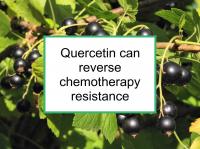Quercetin is a flavonol found in a variety of fruits and vegetables. Population studies have reported that high-flavonol diets are associated with reduced breast cancer risk. Quercetin has been shown to induce the death of hormone receptor positive (ER+/PR+), HER2 overexpressing (HER2+) and triple negative (ER-/PR-/HER2-) cells.
Quercetin has been found to inhibit angiogenesis (the growth of new blood vessels) of mammary tumors in a mouse model of breast cancer. In addition, quercetin has been reported to enhance the treatment effects of radiotherapy and chemotherapy. Now a new study has reported that quercetin enhances the effects of doxorubicin and paclitaxel (paclitaxel) in ER+/PR+ breast cancer cells and reverses multidrug resistance, in part by eliminating breast cancer stem cells.
Quercetin supplements should be avoided
The impact quercetin on breast cancer cells depends on the dosage, with low or high doses potentially stimulating breast cancer cell growth in some cases. When flavonols are consumed as part of food, they are combined with other micronutrients that can act synergistically with them against breast cancer. Consuming flavonol-rich foods is safe. On the other hand, safe and effective dosages of flavonol supplements have not been established.
Quercetin has been shown to interfere with several cytochrome P450 (CYP) enzymes and drug transporters, which suggests that it may alter the response to many drugs, including anticancer drugs. For example, it can inhibit CYP2D6, a crucial enzyme in the metabolism of tamoxifen, which is responsible for the generation of endoxifen, which in turn is thought to account for tamoxifen's beneficial activities in breast cancer patients.
In fact, a few studies have reported adverse effects of quercetin in some circumstances. For example, one study reported that quercetin contributed to the growth of estrogen-induced mammary tumors, but only once the tumors were established in female rats. In other words, supplemental quercetin did not prevent (or induce) tumor initiation but did contribute to tumor growth. Another study reported that while quercetin reduced the growth of glioma cells in the laboratory, it increased the volume of the brain tumors when administered to rats with gliomas. Gliomas are tumors arising from the supportive tissue of the brain. Quercetin supplementation is also suspected of having potential to exacerbate damage in predamaged kidneys. While quercetin appears to protect heart cells from the toxic effects of doxorubicin, it may also reduce doxorubicin's treatment effects in some breast cancer cells. Based on the available evidence, we conclude that quercetin should not be taken in supplement form.
Best food sources of quercetin
Quercetin is abundant in the following foods:
Latest research finds quercetin potentiates chemotherapy
The study referenced above was designed to investigate the effects of quercetin in multidrug resistant hormone receptor positive breast cancer cells. Multidrug resistant cancer cells that overexpress P‐glycoprotein (P‐gp) encoded by the MDR1 gene can be a major barrier to successful chemotherapy. Overexpression of P‐gp can result in chemotherapy failure in a wide variety of cancers, at the same time increasing in the proportion of tumor cells with stem cell-like characteristics. Cancer stem cells are thought to have nearly unlimited proliferative and self-renewal capabilities and to be highly resistant to chemotherapy.
To conduct the study, the authors prepared doxorubicin-resistant human breast cancer ER+/PR+ MCF‐7 cells (MCF‐7/dox: doxorubicin resistant derivatives of MCF-7 cells which overexpress P-gp). Both MCF-7 and MCF-7/dox cells were exposed to treatment with doxorubicin, paclitaxel or vincristine (Oncovin) with and without concurrent treatment with quercetin over 24 hours. The authors then measured cell viability, apoptosis, cell cycle progression, intracellular drug accumulation, and the expression of P‐gp and Y‐box binding protein 1 (YB‐1), in addition to the presence of breast cancer stem cells. Translocation of YB-1 to the nucleus can regulate expression of the cancer stem cell-specific genes. Quercetin treatment was found to significantly heighten the antitumor activities of all three chemotherapy drugs in both MCF-7 and MCF-7/dox breast cancer cells. Quercetin significantly downregulated P‐gp expression, inhibited nuclear translocation of YB‐1, and eliminated breast cancer stem cells. The authors conclude that quercetin reversed multidrug resistance in breast cancer cells by downregulating P‐gp expression and eliminating cancer stem cells mediated by YB‐1 nuclear translocation.
Please see our articles on diet while undergoing treatment with doxorubicin or paclitaxel for more information.
